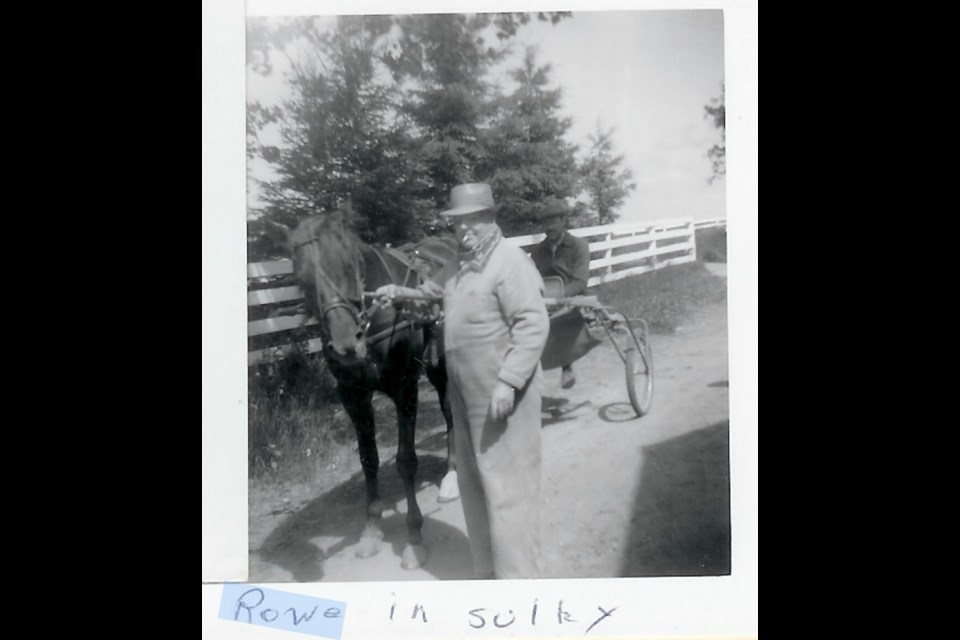William Earl Rowe was born May 13, 1894.
He was born in Hull, Iowa, to Canadian parents. They moved to Ontario when Earl was two years old. He grew up to be a farmer and a cattle breeder.
In 1917, he married the love of his life, the former Treva Alda Lillian Lennox. They had four children — Bill, Lennox and Jean, and one dying during labour.
He was reeve of West Gwillimbury from 1919 to 1923. He served as a member of provincial parliament from 1923 to 1925 and then was elected to the House of Commons, serving until 1935.
From 1936 to 1938, he was the leader of the Conservative Party of Ontario. He did not have a seat in the legislature, so George Henry remained leader of the Opposition.
Rowe failed to win his seat in the 1937 provincial election but regained his seat in the federal House of Commons in a byelection in 1937. He had resigned from his posting two months earlier to run in the provincial election. He was succeeded as leader by former rival George Drew, who went on to serve as premier of Ontario in the 1940s before moving to federal politics.
Rowe served in the House of Commons until 1962 on two occasions — 1954-55 and in 1956, when Drew, due to ill health, was unable to perform his duties. Rowe acted as leader of the Opposition.
From 1958 to 1962, he and his daughter, Jean Casselman Wadds, were the only father and daughter to ever sit together in Parliament.
My grandfather, Harold Bell, often spoke of driving the horse and carriage around the countryside when Rowe was out canvassing. He always spoke highly of Rowe.
From 1963 to 1968, he served as Ontario’s 20th lieutenant governor.
While in that position, one drawback was if he wanted to stay at their home, he had to have security and a chauffeur in residence. A few changes had to be made to accommodate staff.
He would get the staff in a panic when they realized Rowe had got up early and had taken the old truck out for a spin and visited old friends without having tagalongs.
Treva, his wife, still maintained her chickens, collecting eggs every day under the security men’s watchful eye.
When we were in Grade 6 (1961), my mother, Lylia Culbert, taught us, and Rowe’s grandson, son of Bill and Ruth Rowe, was a student in the same grade as myself. Mom contacted Earl Rowe to see if we might be able to go out to the farm in Newton Robinson to see his farm operation and his prized horses.
His most noted horses were trotters, among them Van Riddell. Rowe drove his homebred colt in the 1946 Hambletonian, the most famous of all trotting classics. He did not win the “Hambo,” but Van Riddell’s appearance at the Goshen Historic Track helped bring widespread attention to the sport of harness racing in Ontario. A year earlier, in 1945, Van Riddell became the first of seven winners for the Rowelands Farm in the Canadian Standardbred Horse Society trotting futurity for two-year-olds, an event Rowe won as owner/driver consecutively with Dorothy Riddell (1953), Flash Riddell (1954) and Bert Riddell (1955). Van Riddell’s great reputation as a champion trotter was followed by an outstanding career as a sire. Before his death in 1971 at the age of 28, Van Riddell produced winnings of more than $1 million. Celias Counsel was another great performer for the Rowelands Farm, winning the 1952 Maple Leaf Trotting Classic.
He also worked diligently on behalf of numerous horsemen’s associations, serving as president of the Canadian Standardbred Horse Society twice (1927-28 and 1958-61) and as an honorary director of the Ontario Harness Horsemen’s Association. But it was the breeding and training of horses that was uppermost with Rowe. It was a rare dawn indeed that did not find him tending to these chores on the 1,000-acre farm near Bradford.
Rowe and his son, Bill, were founders of two Ontario harness race tracks — Windsor Raceway and Barrie Raceway. The opening of the all-weather plant at Windsor in the fall of 1965 helped usher in a new era in the sport as major metropolitan centres across North America followed Windsor’s lead with year-round harness racing. Barrie raceway is gone now, but Rowe’s family was instrumental in bringing to Innisfil Township Georgian Downs, which brings much money to the upkeep of the town.
Rowe was happy to have us go out to the farm, where he and his wife showed us around and we saw her flock of laying hens.
We had a great day out at the farm.
Rowe died Feb. 9, 1984, at his beloved home in Newton Robinson.



